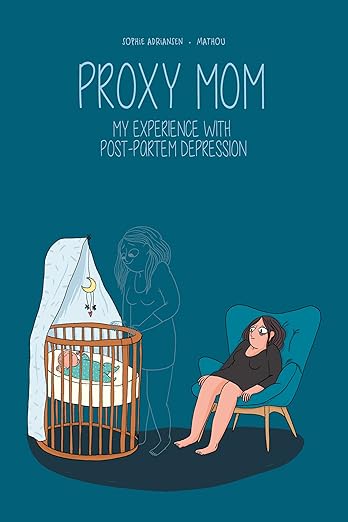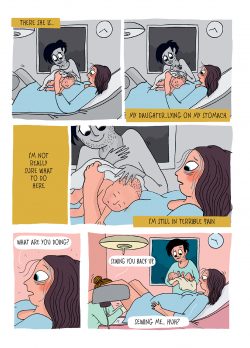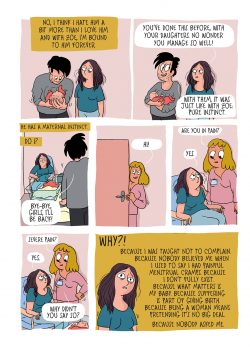
By Sophie Adriansen & Mathou, translated by Montana Kane (NBM)
ISBN: 978-1-68112-334-9 (TPB) eISBN: 978-1-68112-335-6
All human existence and every interaction is basically about chasing the same dreams and aspirations: do something, find someone, stay alive, be happy. Of course, it doesn’t always happen that way. That’s particularly true for women and never more clearly seen than in how our entire species now views perpetuating itself.
Generally speaking, nowhere on Earth does a significant proportion of male humans ever get hands-on with childrearing – at least until the next generation are largely ambulatory, vocally communicative and self-sustaining if not self-supporting. In fact, as increasingly seen in most first world countries, actual day-to-day maintenance of infants, as well as the majority of household domestic duties are regarded (with near-religious devotion and fervour) as the female human/recent mother’s sole responsibilities…
Moreover – as so many deucedly-reasonable chaps on the internet keep insisting – once a lass has completed all the icky female stuff involved in hosting a burgeoning biological parasite inside them, finished undergoing frequently life-threatening physical stresses and appalling corporeal changes, ceased playing natal roulette with medical midwifery systems and/or other far-less-rational religion-poisoned birthing alternatives and at last delivered – in the shame-packed, painfully embarrassing human equivalent to extracting at excessive speed a tugboat from the basement it was unwisely and so rashly built in, any new mother should be up and about: offering sex, biscuits, resumed cleaning services and due deference to the hard work the guy put in by having sex. This she should do in a miraculously fully-restored pre-birth nubile body by the time nurses have taken the infant’s details and recorded its footprint…
Then again, there’s this differing view.
Having a wanted baby is magical, but a moment’s passion demands massive commitment from all involved, right up to and definitely including the national and societal levels. Incubation of a baby inside a completely separate, autonomous human causes massive alterations – many permanent and some of them life- and mental health-threatening.
Smartly underscoring these points by sharing their own expertise as mums, exceedingly well-educated bande dessinée novelist, author and comics writer Sophie Adriansen (Max et les poisons, La vie d’adulte, Nina Simone in Comics) and similarly super-schooled artist/ illustrator Mathilde (Nina & Bruno, Dans le coeur gros d’Anouk, Peurs bleues) Virfollet – AKA Mathou – here compile a cartoon precis of the whole farago from dance floor to domestic domination by relating what so often happens and subsequently deconstructing the so-useful eternal myth of “maternal instincts” as manipulated by men and their mothers…
As La remplaçante, Proxy Mom was first released in 2021 and with wit, brevity and deceptive jollity detailed the story of a woman doing all the right things. Marietta was young, free and single, with a good job and friends. She met Chuck, they fell in love and settled down. One day they decided to have a child together.
And that’s when Marietta’s problems started…
In seductive cartoon style, Marietta discovers every minute of every day what being pregnant means: body-downs and ridiculous changes, diminishing capacities and limitation of faculties, how nine months feels like 40 years and a thousand more minor but ever-escalating shocks and surprises.
This is no scary story shocker and there are no major medical mishaps. That’s the point. This account is all about little stuff that gets to be too much. Chuck is not a first-time dad, and his easy ability to negotiate stuff Marietta is overwhelmed by makes her feel inadequate and unable to cope, as do her friends and relatives who see new baby Zoe but seemingly forget Maritta is still there.
And that’s not even considering the days before the weeks before the birth: extended and terrifying Braxton-Hicks contractions, debilitating pre-partum episodes of “patience and pain” compounded by a frankly sub-par, poorly managed delivery apparently done for the hospital’s convenience.
In the hours and days post-delivery Marietta wallows in acute discomfort, indignity, mounting mental stress and with a growing sense of loss and failure. Even Zoe “latching on” to feed sparks heartfelt conviction of ineptitude and inescapable failure. No wonder Marietta in her doldrums invents the concept of a “proxy mom” to subtract all that pressure and unrevealed further inadequacies before it’s too late…


Gradually, however, stability returns as confidence grows and new mom digests the knowledge that it’s okay to feel crap (like when castigating herself for forgetting to read hospital leaflets on hormones and postpartum depression): admitting that at least she is not that worst of all failures… a Bad Mother…
Ultimately, peppered and forearmed with salient alternative ways women anywhere but Here and Now have stepped up and congregated to raise kids by actively supporting new mums, Marietta weathers her crisis, stops seeking validation and throws off the toxic, hostile pressures of societal expectation…
Delivered lightly and breezily but deadly serious for all that, Proxy Mom finds cheery ways to provide encouragement, support and vital information that will delight women and girls and might just get through to some guys also in need of guidance and tutelage…
© Sophie Adriansen, for the text, 2021. © Mathilde Virfollet, for the illustration, 2021. All rights reserved.
Proxy Mom – My Experience With Postpartum Depression is scheduled for UK release June 18th 2024 and is available for pre-order now.
Most NBM books are also available in digital formats. For more information and other great reads go to NBM Publishing at nbmpub.com.
